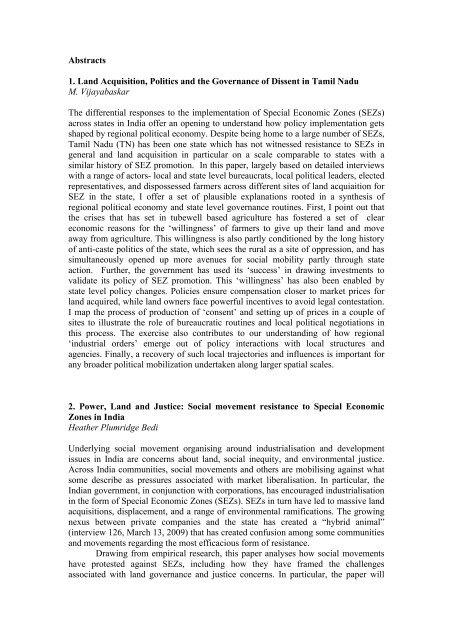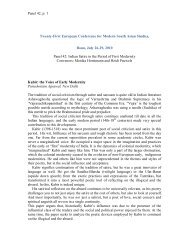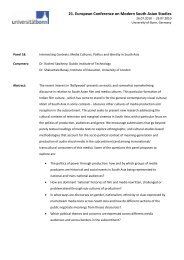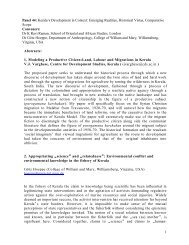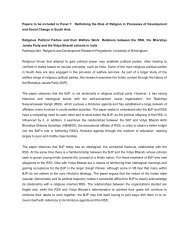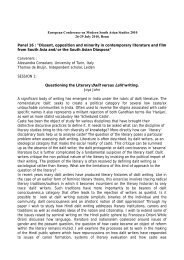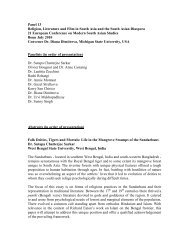Final Panel Abstracts
Final Panel Abstracts
Final Panel Abstracts
You also want an ePaper? Increase the reach of your titles
YUMPU automatically turns print PDFs into web optimized ePapers that Google loves.
<strong>Abstracts</strong><br />
1. Land Acquisition, Politics and the Governance of Dissent in Tamil Nadu<br />
M. Vijayabaskar<br />
The differential responses to the implementation of Special Economic Zones (SEZs)<br />
across states in India offer an opening to understand how policy implementation gets<br />
shaped by regional political economy. Despite being home to a large number of SEZs,<br />
Tamil Nadu (TN) has been one state which has not witnessed resistance to SEZs in<br />
general and land acquisition in particular on a scale comparable to states with a<br />
similar history of SEZ promotion. In this paper, largely based on detailed interviews<br />
with a range of actors- local and state level bureaucrats, local political leaders, elected<br />
representatives, and dispossessed farmers across different sites of land acquiaition for<br />
SEZ in the state, I offer a set of plausible explanations rooted in a synthesis of<br />
regional political economy and state level governance routines. First, I point out that<br />
the crises that has set in tubewell based agriculture has fostered a set of clear<br />
economic reasons for the ‘willingness’ of farmers to give up their land and move<br />
away from agriculture. This willingness is also partly conditioned by the long history<br />
of anti-caste politics of the state, which sees the rural as a site of oppression, and has<br />
simultaneously opened up more avenues for social mobility partly through state<br />
action. Further, the government has used its ‘success’ in drawing investments to<br />
validate its policy of SEZ promotion. This ‘willingness’ has also been enabled by<br />
state level policy changes. Policies ensure compensation closer to market prices for<br />
land acquired, while land owners face powerful incentives to avoid legal contestation.<br />
I map the process of production of ‘consent’ and setting up of prices in a couple of<br />
sites to illustrate the role of bureaucratic routines and local political negotiations in<br />
this process. The exercise also contributes to our understanding of how regional<br />
‘industrial orders’ emerge out of policy interactions with local structures and<br />
agencies. <strong>Final</strong>ly, a recovery of such local trajectories and influences is important for<br />
any broader political mobilization undertaken along larger spatial scales.<br />
2. Power, Land and Justice: Social movement resistance to Special Economic<br />
Zones in India<br />
Heather Plumridge Bedi<br />
Underlying social movement organising around industrialisation and development<br />
issues in India are concerns about land, social inequity, and environmental justice.<br />
Across India communities, social movements and others are mobilising against what<br />
some describe as pressures associated with market liberalisation. In particular, the<br />
Indian government, in conjunction with corporations, has encouraged industrialisation<br />
in the form of Special Economic Zones (SEZs). SEZs in turn have led to massive land<br />
acquisitions, displacement, and a range of environmental ramifications. The growing<br />
nexus between private companies and the state has created a “hybrid animal”<br />
(interview 126, March 13, 2009) that has created confusion among some communities<br />
and movements regarding the most efficacious form of resistance.<br />
Drawing from empirical research, this paper analyses how social movements<br />
have protested against SEZs, including how they have framed the challenges<br />
associated with land governance and justice concerns. In particular, the paper will


